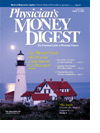Publication
Article
Physician's Money Digest
Compute Your Pension Plan's Return Rate
Author(s):
When meeting with your accountant orfinancial advisor, do you ever reviewoverall investment performance andquantify what annualized rate of returnyour investment portfolio is generating? If you have notgone through this exercise, you may want to do so todetermine if you are, in fact, generating the returns yourequire on your investment portfolio to meet your long-termfinancial goals and make adjustments to yourinvestment strategy as needed.
Leo Silverman, MD, who has recently become aclient of mine, asked me this past March to review hispension and profit sharing plan to determine his overallrate of return. Like many people who have invested inthe stock market, his investment portfolio has weathereda few difficult years. As he is age 56 and plans on retiringwithin the next 7 to 10 years, he wants to make surethat he is on track to retire. In January 2000, the accountbalance in his 401(k) pension and profit sharing planwas $397,168. On Dec. 31, 2003, his account balancewas $638,438. In addition, he had made contributionsof $30,000 in 2000, 2001, 2002, and 2003.
Calculation Process
To determine your investment results, you willrequire the following information:
- Year-end financial statements for the time periodsin question
- Records of deposits and/or withdrawals madefrom the accounts in question, including what datesthey were made
- History of months in when management feeswere assessed to your accounts
In the case of Dr. Silverman, I reviewed his returnsfrom Jan. 1, 2000, through Dec. 31, 2003. Depositstotaling $30,000 have been made annually to his 401(k)pension and profit sharing plan (PSP). In addition, I haveassumed that all deposits were made on the first day ofeach quarter, and that the returns are net of an assetmanagement fee of 1.25% charged annually, assessed at0.3125% at the end of the quarter. Other than managementfees, no other withdrawals have been made fromthis account. By the end of fourth quarter 2003, Dr.Silverman's plan balance totaled $638,438.
Time Value
Utilizing what is known in the financial investmentarena as “discounted cash flow analysis," it is not toodifficult to determine what the real rate of return is onDr. Silverman's PSP. The basic idea behind the concept ofdiscounted cash flow analysis is that money has what isknown as a “time value." In other words, a dollar receivedtoday is worth more than a dollar received tomorrowbecause if you had that dollar today, you couldinvest it and earn interest. Hence, money does indeedhave a time value. By way of a simple example, let ustake a closer look at this concept:
From the above example, one can see that Dr.Silverman's PSP balance on Jan. 1, 2000, was $397,168.If he made no deposits during 2000 and earned a net7% rate of return that year, the year-end balance onDec. 31, 2000, assuming that there were no other fees,expenses, or withdrawals assessed against the account,would be $424,970. Hence the concept of discountedcash flow. Obviously, you would have to adjust thesefigures to reflect the deposits made to the PSP duringthe course of the year, which of course were factoredinto the equation for Dr. Silverman. Conceptually, thisis how the problem is solved.
I cannot stress enough the importance of goingthrough this exercise, no matter how mundane it mightappear. Such an exercise is crucial from a long-termretirement planning perspective, because the higher thereturn, the faster the rate of compounding and accumulation,especially on a tax-deferred basis, and the greaterthe annual income distributions that can be generatedduring your retirement years.
Thomas R. Kosky and his partner, Harris L.Kerker, are principals of the Asset Planning Groupin Miami, Fla, specializing in investment, retirement,and estate planning. Mr. Kosky teaches corporatefinance in the Saturday Executive andHealth Care Executive MBA Programs at theUniversity of Miami. He welcomes questions orcomments at 800-953-5508, or visit www.assetplanning.net.
